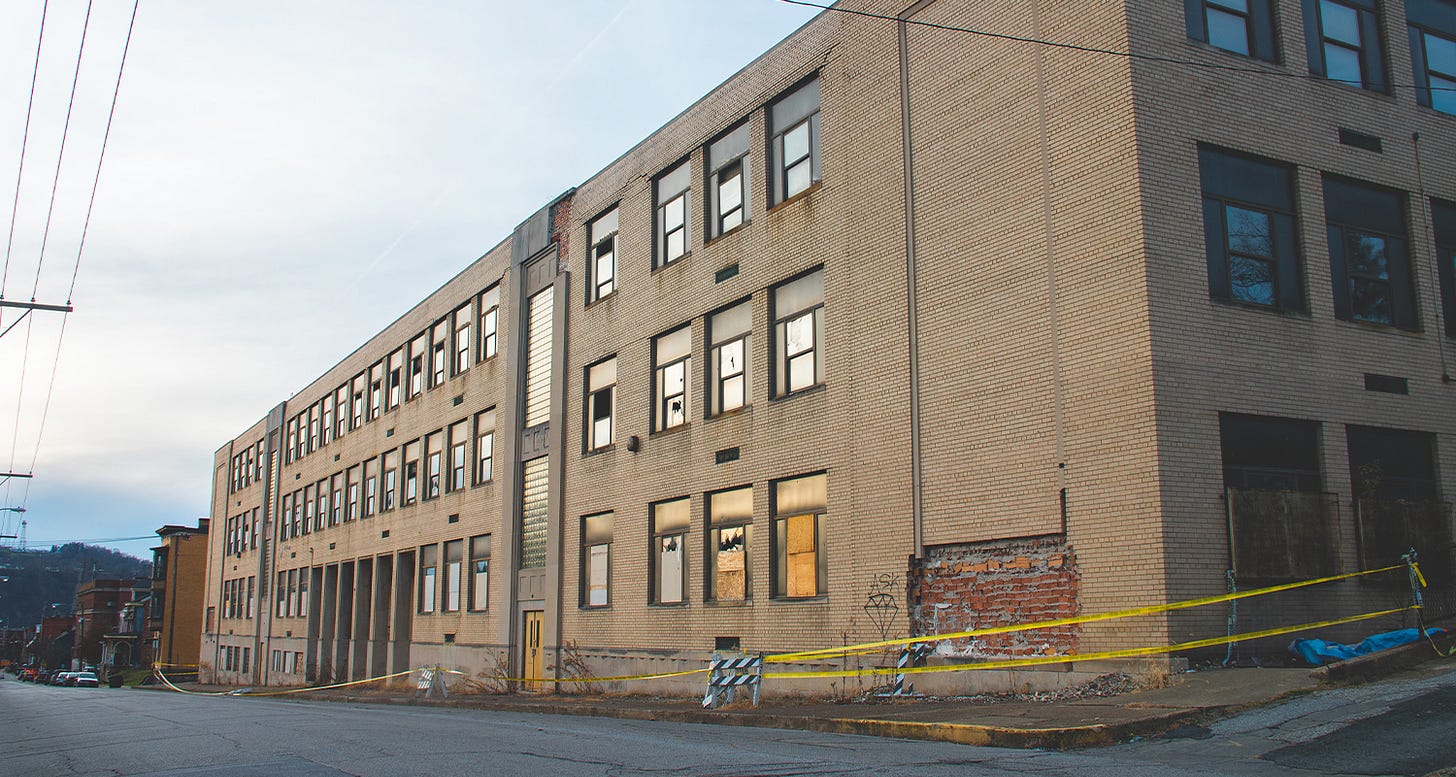Council approves Island redevelopment; Clay School countdown begins
The Wheeling City Council also approved its fifth opioid settlement request for WTRF-7News and alluded to flood repairs wrapping up in the near future.
WHEELING – The Wheeling City Council met on Tuesday, Dec. 3 to discuss several issues, including consideration of a redevelopment plan that would see a former WesBanco drive thru transformed into a convenient store with a gambling parlor, the fate of the historic Clay School, and repairs to the flood-damage wastewater treatment plant.
Gambling on the Future…
Wheeling Island, one of the city’s most densely populated neighborhoods, has been without a convenient store for several years. Residents looking for grocery staples, like bread, eggs, and milk, have to travel to Martins Ferry, Ohio, or mainland Wheeling for these goods. People without a car either have to take hours-long bus rides, walk along major roadways, or rely on the kindness of their family, friends, and neighbors.

Now, a small convenient store is set to open on the Island.
Proposed by Larry Lewis, owner of Bogey’s Carryout which operates 15 locations in the region, the site would see a small cold deli, frozen foods, eggs, milk, bread, beverages, and other items. While Islanders were hopeful for this part of the business, several others have concerns over plans to open a gambling parlor with video lottery machines in the business’s backroom.
Councilor Ben Seidler, who lives on and represents the Island, stated in November, when the project was first proposed, that he had concerns over the expansion of lottery establishments. Still, Seidler said his constituents have long exclaimed the need for a convenient store.
Shawn Viles excoriated the idea of another lottery establishment. “We have 14 [gambling parlors] in a three block radius. That’s a lot,” Viles said. Wheeling Island Community Association president Courtney Droginske reiterated Viles’ and other community members’ concerns. “I want you to think about any other neighborhood in Wheeling where there are 13 places to gamble within a two mile radius,” Droginske said. “You can’t. I’m not sure anyone would ever be okay with even five gambling parlors in your neighborhood, let alone 13.”
Despite his constituents' concerns, Seidler said he ultimately supported the plan.
City Solicitor Rosemary Humway-Warmuth helped quash concerns that the convenient store would not be built, but the gambling parlor would. “Based upon the information provided, if the city council votes to approve [the request] then that is what needs to materialize. If it wouldn’t, it’s like any other hearing…there would be injunctive relief that [the city] would seek in the Circuit Court of Ohio County to enforce the agreement,” Humway-Warmuth said.
All seven council members supported the redevelopment project.
Clay School Countdown…
Councilors have been considering action on the historic Clay School in East Wheeling for years now. In Feb. 2023, the former council approved funding for a viability study to explore options for the property. In August of this year, Tipping Point Real Estate Development representative Tim Ambrose presented a study detailing the cost associated with rehabilitation or demolition.

During that presentation, Ambrose said a survey of community members saw half of respondents support the school’s demolition and half support its rehabilitation. Three of the four scenarios presented by Ambrose include rehabilitation at a price tag of $23-25 million. Demolition could see costs range from $13.7-24.1 million.
At their Dec. 3 meeting, councilors approved $125,400 of U.S. Environmental Protection Agency grant funds for environmental remediation of the site, but City Manager Robert Herron said more action is needed. “It would be helpful to receive guidance from council as to what they might like to do with the Clay School,” Herron said.
With environmental remediation set to begin in the new year, the process is much more careful and costly if rehabilitation is the goal, Herron said. If demolition is the goal, environmental remediation would still occur, but ultimately cost less money. The city has received soft assurances that West Virginia Department of Environmental Protection Dilapidated Properties Program (DLAP) funding would be available to aid in the building’s demolition.
Council could consider action on the Clay School as soon as Dec. 17.
April Repairs Remain…
Councilors approved nearly $60,000 to reroute a damaged emergency generator at the wastewater treatment plant stemming from flood damages in April.

On April 5, the Ohio River crested at 41.49 feet, inundating much of Wheeling Island, Center Wheeling, and South Wheeling. On April 12, the river again reached flood stage when it crested at 37.8 feet. The wastewater treatment plant, located in Center Wheeling, survived the first flood without major damages, but as waters rose a second time an item stuck in the plant’s intake gate cause water to surge into the facility.
Wheeling Free Press was the first organization to report on what happened at the plant.'
Superintendent Andy Harris explained the facility’s dry pit, which contains much of the plant’s mechanical equipment, flooded 30 feet. For weeks, the plant was offline and pumping raw sewage into the Ohio River.
So far, the city of Wheeling has spent at least $2,446,085 on flood repairs at the wastewater treatment plant. Herron has long explained that the Federal Emergency Management Agency and the city’s insurance company are expected to reimburse all costs. “Hopefully, we are coming to the end,” Herron said of flood repairs.
Opioid Funds Flow…
WTRF-7News requested, and was approved for, the use of $5,500 of opioid settlement funds to reimburse the organizations September programming “Saving a Generation,” which covers the opioid epidemic. Opioid funds can be used on media for drug abatement purposes.
While WRTF-7News’ use of opioid funds is arguably for the community’s good, recent approvals for the Wheeling Police Department has drawn the ire of typically conservative-leaning newspaper The Intelligencer.
On Dec. 4, the editorial team released an op-ed urging the city council to spend opioid settlement funds on community solutions. “City leaders, with future funding coming from the state’s opioid settlement, would be wise to help fund programs that help steer those addicted to a brighter future instead of solely focusing on how to lock them up,” the piece read, in part.
Here at Wheeling Free Press, we too have argued that opioid settlement funds should go to people, not the police. Our main argument has revolved around the fact that the police are continuously approved for expenditures outside their budget. If they want something, they get it, as shown by over $80,000 in approved funds at the Dec. 3 meeting.
When Wheeling Free Press made this argument, the Chief of Police called it “silliness.” Hopefully, city leaders will listen to The Intelligencer, who has served this community since 1852.
Ordinances Passed; Ordinances Proposed
The Wheeling City Council adopted nine ordinances and three resolutions, including:
$59,310 to ERB Electric Company of Wheeling for flood repairs to the wastewater treatment plant;
$84,144 yo Leonardo U.S. Cyber and Security Solutions, LLC. of Greensboro, N.C. for Software services, equipment, and an annual subscription for the city’s new parking enforcement technology;
$18,497 with Motorola Solutions of Coraopolis, Penn., for police cruiser radios;
$125,275 to Montrose Environmental of Wheeling for environmental remediation at the Clay School;
$5,500 of opioid settlement funds to WTRF-7News for a special entitled “Saving a Generation”;
$66,192 to Bearcom of Dallas, Texas, for “equipment” to outfit new police vehicles;
$228,454 with Hunter Truck Sales of Smithfield, Penn., for a recycling truck;
$46,240 to Digital-Ally of Lenexa, Kan. for police body cameras;
An agreement with Civil and Environmental Consultants, Inc. of Bridgeport, W.Va. not to exceed $40,000 for a Wheeling Heritage Trail Connector Project;
A resolution approving Bogey’s Carryout redevelopment project on Wheeling Island;
A resolution approving “foods for fines,” where overtime parking tickets can be paid with food donations; and,
A resolution approving a $15,000 facade grant to Jessica Barclay of 1052 Main Street.
The Wheeling City Council will meet again on Tuesday, Dec. 17. Those wishing to address the council should plan to arrive prior to 5:15 p.m., when the sign up sheet is removed. The agenda for the meeting will be posted to the city’s website on Friday, Dec. 13.

